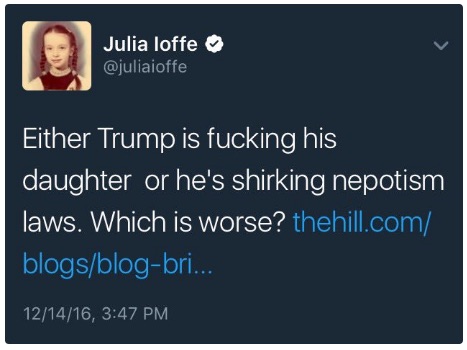When journalists step over the line: the Julia Ioffe incident
The Trump era is a rough time for journalists. No matter how much they’re provoked, if they show too much bias and disrespect, they could lose their jobs, even for a single tweet. That’s what happened to Julia Ioffe at Politico, and it’s a revealing case study.
I’ll get to what Ioffe did in a moment. But first, let’s have a look at the email Politico’s editors Carrie Budoff Brown and John Harris sent to their staff when they fired her:
You will remember the note from John and me a few days ago in which we emphasized that POLITICO journalists are representing the publication at all times and on all platforms, and must present themselves accordingly. We also emphasized that the power of POLITICO comes from our independent reporting and analysis. Gratuitous opinion has no place, anywhere, at any time – not on your Facebook feed, your Twitter feed or any place else. It has absolutely zero value for our readers and should have zero place in our work. Julia Ioffe’s tweet this afternoon about President-elect Trump – currently and understandably racing across social media – is a clear example of the opposite of what we were talking about.
This is as clear as it gets. If you’re trying to make a point, this is how you make it: no equivocation, no jargon, and direct, first-person statements.
What did Julia Ioffe do?
Julia Ioffe, a journalist who has written for The New Yorker and The New Republic, is finishing a stint at Politico. She read an article suggesting that Trump’s daughter Ivanka might be taking the space in the White House typically reserved for the first lady, who is going to stay in New York instead of moving to DC. So Ioffe tweeted this:

I’m sure when she wrote it, Ioffe felt completely justified. Trump tweets terrible insults to journalists all the time, mostly in retaliation. For example, here’s what he wrote after Vanity Fair published a scathing review of the restaurant in Trump Tower:
Has anyone looked at the really poor numbers of @VanityFair Magazine. Way down, big trouble, dead! Graydon Carter, no talent, will be out!
— Donald J. Trump (@realDonaldTrump) December 15, 2016
The problem here is not just the profanity, either. If Ioffe had tweeted “The conspiracy theories about Trump and the election have gotten fucking insane,” I don’t think Politico would have fired her.
Suggesting incest certainly crosses a line. The problem is that this tweet is a profane, personal attack. That’s a fatal combination for a journalists.
Ioffe has deleted the tweet and apologized repeatedly, but you can’t unfire a bazooka.
Rules for journalists in the Trump era
Politico’s policies are those that should apply at any legitimate news source.
- Contributors need to treat those they cover fairly, even if the reverse is not true.
- Reporters must report facts, not make things up.
- Reporters and contributors’ social media feeds are part of their work stream, and must obey the same rules.
If a news site does not behave like this, it’s not reporting news, it’s posting opinion and antagonism as facts. You can be the loyal and decorous opposition, or you can be the profane and shouting opposition, or you can write news, but you have to pick one.
If you believe that Trump’s behavior enables journalists to throw off their own shackles and behave as they wish . . . then you’re wishing for the end of independent media. And right now, we need them.
At the least, a reporter should be allowed to also have their own personal opinion. HOWEVER, there is such a thing as understanding that when you have an audience, like a reporter would, they have a responsibility to publicly exercise discretion. Our current culture seems to crave opinions, while at the same time holding media to a higher standard under the belief media should remain impartial, even as the public wants that very media to echo their own opinions. Still, anyone in the media, from reporters to anyone with fame, should be allowed to voice their personal opinion, but do so by creating an alias account, so that whatever their personal opinions mean, it doesn’t end up undermining peoples’ trust in the paper or news format that person is working in.
I was shocked and offended when I read what Ioffe tweeted, and I’m not a Trump supporter. I agree that she crossed a professional line. I don’t think that being a reporter equals taking away her right to free speech and thats where the lines blur between her personal rights and professional responsibility. So, the get around would be to just create alias accounts and then reporters can have their free speech without crossing professional boundaries.
What she wrote is nothing more than uncontrolled blatant emotionalism. Such hurtful suggestive nonsense is meant to hurt and defame, not report. She is just another example why journalism is dead to the average consumer.